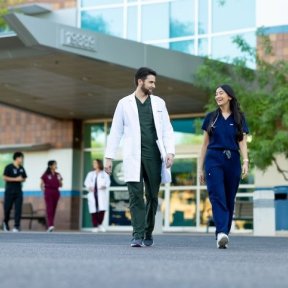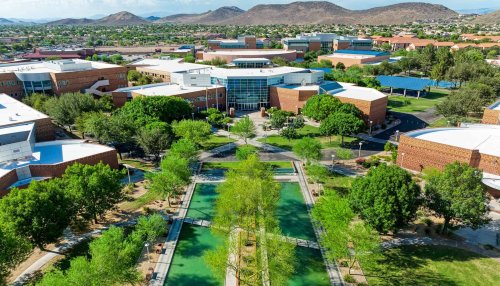Glendale and Maricopa County
Economic Impact
As a key economic driver in the region, Midwestern University plays a crucial role in the economic vitality of the City of Glendale, Maricopa County, and the State of Arizona.
In 2024, the University commissioned a comprehensive, independent analysis by Applied Economics, a specialized economics consulting firm, to determine its current and ongoing financial impact.
$767 Million Overall Impact
In 2023-24, Midwestern University generated a total economic impact of $767 million in Maricopa County, driven by University operations, local vendor purchases, spending by employees and students, and campus visitors.
Student Spending: $172.5 Million
Student spending generated significant local demand, supporting 698 jobs and $41.2 million in labor income at local businesses, contributing to an annual economic impact of $172.5 million.
990 Direct Jobs and $121.9 Million Payroll
Employment at Midwestern has increased by 37 percent over the past five years. The University employs 990 full- and part-time faculty and staff with a total annual payroll of $121.9 million, providing quality, well-paying jobs for Arizona residents. An estimated 99 percent of the employees live in Maricopa County.
Community Impact
Service at Midwestern University: A Core Value
For over a century, Midwestern University has prioritized community service as a fundamental part of its mission.
Midwestern University students, faculty, and staff actively contribute to their communities through year-round initiatives, including health fairs, lecture series, school seminars, medical care for the homeless, and physicals for student-athletes.
Despite demanding coursework, students dedicate thousands of volunteer hours annually, supporting local agencies and making a lasting impact. Students on both campuses consistently volunteer at agencies such as:
|
|
Glendale, Maricopa County, and the State of Arizona
$22.4 Million in State and Local Tax Revenues
Midwestern indirectly generated an estimated $22.4 million in state and local tax revenues. Employees, students, and visitors created $6.9 million in estimated state sales taxes and $4.5 million in estimated local sales taxes in 2023-24. Estimated local property taxes to the city, county, school district and other local taxing districts totaled $5.5 million, and Midwestern University supported $5.4 million in estimated state income tax revenues in 2023-24. Visitor hotel spending is also subject to local lodging tax, generating an additional $178,000 in tax revenues to the city of Glendale.
$75.9 Million in Local Vendor Spending and 455 Jobs Supported
The University and its clinics strengthen the local economy through strategic purchases of materials, utilities, equipment, furniture, professional services, facility maintenance, food service, office supplies, and other goods and services. In 2023-24, local purchasing totaled $75.9 million, with $46.1 million directed to industries that drive local economic impacts. This spending generates an additional $111.0 million in annual economic impact, supporting an estimated 455 jobs in related supplier businesses and contributing $36.3 million in local labor income.
$173.7 Million in Employee Spending and 908 Jobs Supported
The 990 faculty, staff, clinic employees, and residents at Midwestern University, along with employees at supported local vendors, contribute significantly to consumer spending, supporting 908 jobs and providing $55.5 million in labor income for other local businesses.
$9.6 Million in University Visitor Spending
Visitors to Midwestern University, including those attending admissions-related events and special University activities, contributed 40,700 visitor days to the local economy. These visitors spent an estimated $9.6 million on local goods and services such as food, lodging, transportation, retail, and entertainment. This spending resulted in an induced economic impact of $16.4 million, supporting 109 local jobs and generating $5.6 million in labor income within the hospitality industry.
$269.7 Million in Construction Expenditures
From fiscal years 2024 through 2032, Midwestern University is projected to spend $269.7 million on current and planned construction projects, which could generate a one-time economic impact of $521.8 million in Maricopa County, supporting approximately 3,300 jobs and $234 million in labor income.
Caring for Our Community
139,772 Annual Patient Visits to Our Clinics
Midwestern University’s Clinics offer essential, affordable healthcare services to the community while providing hands-on experience for students, with community members actively contributing to the education of future providers. The clinics include: Multispecialty, Dental, Eye, Therapy, and Animal Health.

Expanding Scientific Knowledge
Research Grants: $2.9 million in 2023-24
The Glendale Campus secured $2.9 million in sponsored research grants, a significant increase from $1.9 million five years ago. This funding enables the University to contribute to ground-breaking studies, advancing knowledge in healthcare and other fields.

Fueling Economic Growth
Faculty
actively teach, conduct research, and mentor their future colleagues
Glendale Campus Alumni
are working in leading hospitals, pharmacies, private practices, governmental agencies, academic institutions, and healthcare facilities nationwide and in the Metro Phoenix area
Professional Staff
are employed to support the academic mission of the University
Students
enrolled on the Glendale Campus who contribute to the local economy

